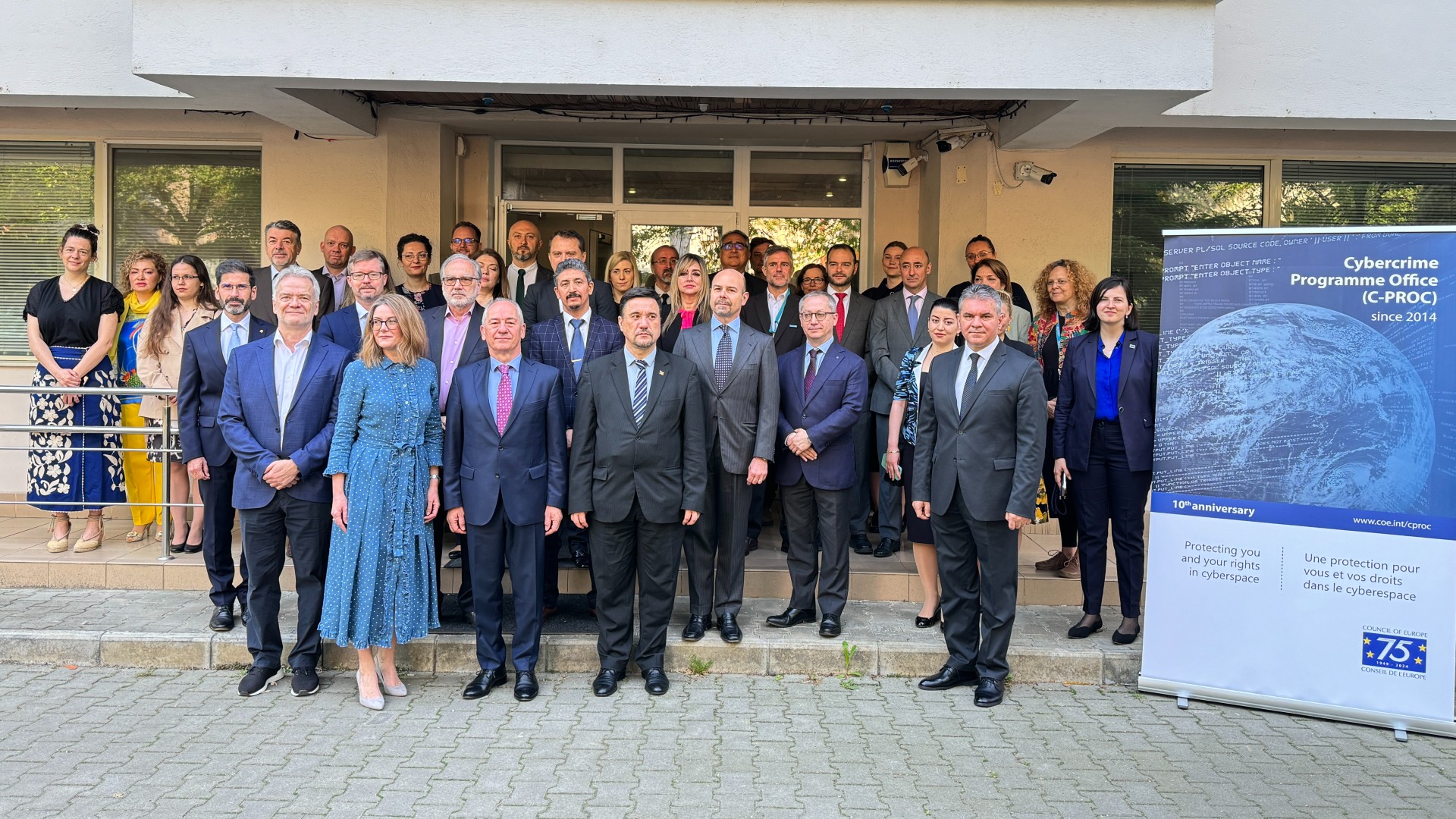The Cybercrime Programme Office of the Council of Europe (C-PROC), based in Bucharest, celebrates this month 10 years since it was established. On this occasion, a meeting with the diplomatic community and representatives of international organisations in Bucharest was hosted by C-PROC at its office within the UN House on Primaverii Bd.
The meeting aimed at being an interactive session of exchange of views on challenges in the field of cybercrime and electronic evidence. Among the guests that took the floor were Traian Hristea, State Secretary within the Ministry of Foreign Affairs of Romania, H.E. Stelian Stoian, Ambassador of Romania to the International Organisations in Vienna, Mara Roman, a.i. Head of the European Commission Representation in Romania, Michael Dickerson, Deputy Chief of Mission for the United States of America, Alexander Seger, Head of the Cybercrime Division of the Council of Europe and Head of C-PROC.
Among the topics addressed the focus was on the overview of the history of the Office, on its model of operating and the international legislative standards on which its activity is based, on celebrating the results and impact during the first 10 years, on presenting lessons learned between 2014-2024 and the tools developed during these years, available for countries worldwide for strengthening their criminal justice authorities. At the same time, an overview of the new, ongoing projects was made, the main challenges faced at the moment and identified solutions, through international cooperation, were discussed, as well as the current status of the negotiations at the United Nations level on the elaboration of an additional convention in the field of cybercrime.
In addition to cybercrime, C-PROC’s activities are targeted at supporting capacity building at national level and international cooperation with regard to any type of crime that involves electronic evidence. In this sense, the Second Additional Protocol to the Convention on Cybercrime, on enhanced co-operation and disclosure of electronic evidence, signed so far by 43 States and already ratified by 2 States, is a new tool made available by the Council of Europe since May 2022.
The diplomatic community and international organisations play an especially important role in making the efforts and activities implemented globally by the Council of Europe (through C-PROC) more efficient, cybercrime and electronic evidence not knowing physical borders and constantly evolving. It is therefore necessary that the international organisations and the diplomatic community be informed on these realities in a field as topical and present in the lives of the citizens.
At the same time, the celebration of the 10th anniversary since C-PROC became operational constituted an occasion to once again acknowledge the importance of the international support in carrying out its activity, through collaborations and voluntary contributions of donors such as the United States, United Kingdom, Japan, Canada, Italy, Iceland, Hungary and others and joint projects between the Council of Europe and the European Commission. Without this support, those well over 2100 activities organised for more than 130 countries from all the regions of the world would not have been possible and C-PROC would not have had today’s results – results which have surpassed by far the expectations had when it was established, as was confessed during today’s meeting as well.
At the moment, States from all the regions of the world benefit from support from C-PROC, constantly requesting the organising of activities to increase the capacities of criminal justice systems against the challenges posed by cybercrime and e-evidence. C-PROC’s functioning model, based on the “dynamic triangle” of common standards (the Convention on Cybercrime and its additional protocols), the Cybercrime Convention Committee (T-CY) and capacity building by C-PROC, constantly generates innovation. This approach is unique and comprehensive.
C-PROC will remain closely linked to the Budapest Convention and the T-CY as part of the “dynamic triad”. Therefore, assisting countries in the implementation of Second Protocol – with its tools for direct cooperation with service providers, for cooperation in emergency situations, or for joint investigation teams but also its data protection safeguards to facilitate cooperation – will be a priority.
C-PROC will continue to support human rights, democracy and the rule of law in cyberspace. It will permit more people to cooperate more and better in order to make a difference.
Today’s meeting is part of the programme dedicated to C-PROC’s 10th anniversary, that started with a meeting hosted by the National Institute of Magistracy on Thursday, 11 April 2024, with the aim of taking stock of the impact the Office has had since it became operational in 2014 and of analysing avenues of further cooperation between Romania and the Council of Europe in this sense.
The Council of Europe is the continent’s leading human rights organisation. Since its foundation in 1949, the organisation has created a common legal space, centred on the European Convention on Human Rights (ECHR) across its 46 member states, for more than 700 million people. The Council of Europe’s Convention on Cybercrime, opened for signature in Budapest on 23 November 2001, gathers so far 93 States, 70 being Parties, 2 having signed it and 21 having been invited to accede.
More information:
Council of Europe: Action on cybercrime
Council of Europe: Cybercrime Programme Office (C-PROC)
Council of Europe: C-PROC@10: Flyer (English)



